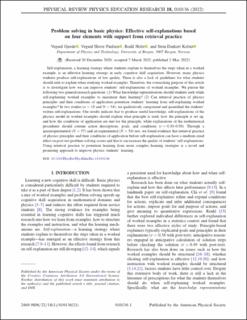Problem solving in basic physics: Effective self-explanations based on four elements with support from retrieval practice
Journal article, Peer reviewed
Published version

Åpne
Permanent lenke
https://hdl.handle.net/11250/2995717Utgivelsesdato
2022Metadata
Vis full innførselSamlinger
- Department of Physics and Technology [2161]
- Registrations from Cristin [10412]
Originalversjon
Physical Review Physics Education Research. 2022, 18, 010136. https://doi.org/10.1103/PhysRevPhysEducRes.18.010136Sammendrag
Self-explanation, a learning strategy where students explain to themselves the steps taken in a worked example, is an effective learning strategy in early cognitive skill acquisition. However, many physics students produce self-explanations of low quality. There is also a lack of guidelines for what students should seek to explain when studying worked examples. Therefore, the overarching purpose of this article is to investigate how we can improve students’ self-explanations of worked examples. We pursue the following two general research questions: (1) What knowledge representations should students seek while self-explaining worked examples to maximize their learning? (2) Can retrieval practice of physics principles and their conditions of application potentiate students’ learning from self-explaining worked examples? In two studies ( n = 1 8 and N = 5 4 ), we qualitatively categorized and quantified the students’ written self-explanations. Our results indicate that to produce useful knowledge, self-explanations of the physics model in worked examples should explain what principle is used, how the principle is set up, and how the conditions of application are met for the principle, while explanations of the mathematical procedures should contain action descriptions, goals, and conditions ( r = 0.30 –0.50). Through a quasiexperimental ( N = 5 7 ) and an experimental ( N = 5 4 ) test, we found evidence that retrieval practice of physics principles and their conditions of application before self-explanation can have a medium-sized effect on post-test problem-solving scores and that it can increase the quality of students’ self-explanations. Using retrieval practice to potentiate learning from more complex learning strategies is a novel and promising approach to improve physics students’ learning.
